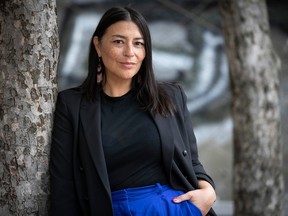Table of Contents
“It was only when I started crying that I knew I’d keep the song for the album,” singer says of the songs she chose for Inuktitut.

Postmedia may earn an affiliate commission from purchases made through our links on this page.
Article content
Elisapie had a simple method for choosing songs for her new album. If the song made her cry, she’d include it.
The album, Inuktitut, was released Friday by Montreal record label Bonsound, and it features the extraordinary singer interpreting 10 songs that meant a lot to her growing up in Salluit, the Inuit community in the Far North of Quebec. She sings the songs in her mother tongue, Inuktitut. It’s a powerful collection that’s already gaining the attention of some pretty famous folks.
Advertisement 2
Article content
Article content
In the lead-up to the launch of the album, Bonsound released five songs/videos. The first was a rendition of the Blondie classic Heart of Glass (Uummati Attanarsimat), performed in a quiet folky style. Blondie lead singer Debbie Harry heard it and was so moved she wrote Elisapie a heartfelt email. Metallica drummer Lars Ulrich was also impressed by her cover of the superstar metal band’s hit The Unforgiven (Isumagijunnaitaungituq) and he shared the video on his social media.
For Elisapie, it was all about choosing songs that marked her early life in Salluit.
“I always said that one day I’ll do a covers album, like Inuit folk songs,” Elisapie said in a recent interview. “Then it was the pandemic and I said, ‘maybe it’s the time.’ Then the songs started coming in in a very intense way. I’d get very emotional. And I was like, ‘What’s going on?’ I was crying. It was only when I started crying that I knew I’d keep the song for the album.
“The ones that I didn’t cry to, which could have been very cool versions, they didn’t make it because there wasn’t enough emotion,” she said. “I mean, anyone can do a covers album. If I don’t feel enough, I’m not going to be able to interpret these huge songs. They’re all already so beautifully interpreted by the original artists. I’m not a great singer. I had to really make them my own. The more emotion there was behind the song, the more I was like, ‘OK, we’ve got something.’ ”
Article content
Advertisement 3
Article content
Many would disagree with her assessment of her singing ability — Elisapie has a voice that has such soulful warmth and it works wonders on these atmospheric songs created with the help of Montreal producer and guitarist Joe Grass.
Each song evokes a specific memory for Elisapie. Queen’s I Want to Break Free (Qimatsilunga) is inspired by her cousin Tayara. He was older than her, but they were very close and this was his favourite song, an anthem about staying true to who you are. He later took his own life.
“He was someone, whenever he would go to Montreal, or outside my town, he loved dressing up in pink and purple,” Elisapie said. “I always felt so sad that he was never able to be himself. I think Queen was such a huge influence to so many Inuit, and so many people in the world, they talked about wanting to break free.”
Elisapie so believed in this project, her fifth album, that she recorded it not knowing if she would get the rights to the songs. It was recorded almost two years ago. Then her publishing team took the album and spent a year securing the rights to the songs, which also include Fleetwood Mac’s Dreams, Cyndi Lauper’s Time After Time, Pink Floyd’s Wish You Were Here, The Rolling Stones’ Wild Horses and Led Zeppelin’s Going to California.
Advertisement 4
Article content
“Some were very quick,” Elisapie said. “Metallica was very quick. Fleetwood Mac. Rolling Stones were very quick.”
The tough ones were Cyndi Lauper, Pink Floyd and Led Zeppelin. So Elisapie rolled the dice, recording the songs with the hope the artists would allow them to release the covers. For example, they brought in the acclaimed New York brass quartet The Westerlies to record a horn-heavy take on Wish You Were Here.
“We rented a studio, I paid for four plane tickets, paid their housing and paid for the arrangement,” Elisapie said. “We were taking a big risk, but we just had to try it. We thought, ‘(Pink Floyd) just has to hear it and maybe that will help.’ Almost a year later, Pink Floyd approved it. I cried.”
During our conversation, Elisapie spoke often of crying, of sadness, and as we rapped she spoke about that melancholy behind the choice of these songs.
“You might not think that, because I’m a singer, I’m smiling, I have confidence,” Elisapie said. “When you’re from the north, from an (Indigenous) community, no matter how much you’re loved, no matter how much the stars are aligned, you still inherit some sort of suffering. Just that feeling of feeling oppressed, feeling that we have been forgotten, feeling that we don’t deserve the same thing as white people. I was just like any normal teenager in the north.”
-

My Pandemic Year: Elisapie’s 2020 has been marked by social change
-

New music review: Travelling Love, Elisapie (Avalanche)
Advertisement 5
Article content
Comments
Postmedia is committed to maintaining a lively but civil forum for discussion and encourage all readers to share their views on our articles. Comments may take up to an hour for moderation before appearing on the site. We ask you to keep your comments relevant and respectful. We have enabled email notifications—you will now receive an email if you receive a reply to your comment, there is an update to a comment thread you follow or if a user you follow comments. Visit our Community Guidelines for more information and details on how to adjust your email settings.
Join the Conversation